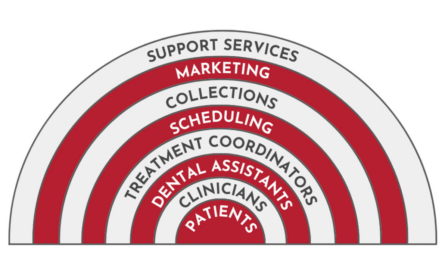By Mike Uretz
Congratulations – As a group you’ve finally decided to pull the trigger on purchasing an electronic dental records system, increasingly being referred to in our industry as an electronic health records system (EHR). You’ve actually been thinking about this for quite a while with all the buzz surrounding clinical consistency and standardization, introduction of diagnostic coding sets, development of accountable care organizations, introduction of electronic referral technology, availability of federal subsidies for acquisition of EHR technology, growth of the oral systemic connection research, popularity of patient web portals, and looming changes in insurance reimbursements including focus on patient outcomes.
So, it appears that the writing is on the wall. For many reasons (many of which were pointed out in my previous article “Electronic Dental Records and the Efficient Group Practice”), it became apparent that this was one time you didn’t want to be left behind in a technological void. So, now you’re a willing participant in your own EHR adoption – but, what comes next?
As I consult with various dental professionals around the country regarding selection, purchase, and implementation of electronic dental records, I am fortunate to have met some great people along the way willing to share their concerns, worries, apprehensions and their personal stories. And the most critical piece of advice I share with them is “In order to level the playing field with vendors you must take charge and be in control of all the steps in this process”.
HOW DO I LEVEL THE PLAYING FIELD BY TAKING CHARGE OF MY PRODUCT SELECTION?
First of all, let’s get one thing clear. No matter what anybody says, you aren’t forced to purchase your present software vendor’s EHR offering if it doesn’t meet your needs from a technology, feature set, or ease-of-use perspective. We have been moving to a world where folks look at software as best-of-breed solutions and since your choice of EHR is essential to your future success is a group practice, it is important that you look at the selection in this way. Now, the caveat to that, of course, is that if your present software vendor does offer an EHR which fits your needs, then of course that is a good way to go. The point is don’t feel held hostage by your present software solution, as technology has changed dramatically over time and you need to implement the best solution for your needs.
So, how do you best come up with determining the right solution for your group? You could spend hours surfing the Web late at night, reading opinions, comments, and testimonials, hoping that one vendor will rise to the top. You could buy your colleagues expensive lunches in exchange for their thoughts and opinions. Or, you keep engaging in endless demos with pushy salespeople until you can’t do it anymore.
Or, you could do it “properly” and conduct an analytical process that puts you squarely in charge of determining the best product for your needs in a timely fashion. And there are some tools that allow you to be proactive and get what you need from vendors rather than having the vendors control the process.
REQUEST FOR PROPOSALS
Why not let the vendors do a lot of the work for you with a nice little tool known as a Request for Proposal (or Request for Quote if you prefer). As a group practice you have many needs they can be detailed from various parts of your organization. Because of the work involved from the vendor side in answering an RFP, this can give you an idea of who is willing to work with you, develop a partnership, and address your needs. This document can consist of a number of areas, and at a minimum should have:
1) A Vendor business profile consisting of a laundry list of measures such as customer base, staff breakdown (R&D, support, etc.), profitability, product maturity, etc.
2) EHR feature requirements you are interested in broken into a matrix of “must have” and “desirable but not essential” features.
3) Implementation and training processes
4) Support processes
5) Technical considerations
REQUEST FOR PROPOSALS ARE IMPORTANT BECAUSE THEY CAN:
1) Communicate needs and expectations
2) Provide for a side by side feature comparison
3) Give you a sense of the vendor as a business
4) Document vendor commitments and promises
5) Be part of the overall contract
And, best of all, it doesn’t cost you anything at this point, except some “sweat equity”.
SCENARIO-BASED DEMONSTRATIONS
Be in control and get what YOU need from your EHR demonstrations. An old cliché that applies to most vendor run demonstrations… “Don’t let the inmates run the asylum”. The point here is that salespeople are well-trained to try to figure out how they should run a demonstration to make the sale but they don’t necessarily always take into account what you want to see what’s most important to you and tend to run things their way.
So the best strategy to counter this is to spend some time upfront before you enter into a demonstration by developing various clinical scenarios that you would normally see in your daily life. Be in charge and have the vendor show you how their software would accommodate various situations that you are familiar with regarding your patients. It’s a little bit of work for you to do this but by telling the vendor what you’re interested in seeing drive puts you in more control.
Also, be wary of vendors who tend to have a one sided conversation, discussing solutions before they even understand your needs. You kind of feel that they are in sell mode all the time. Also, the liberal use of technical jargon to impress or confuse is a red flag. Finally, watch out for promises by vendors of great features to come, which might not materialize and are known in the industry as vaporware.
HOW DO I LEVEL THE PLAYING FIELD BY TAKING CHARGE OF VENDOR PRICE NEGOTIATIONS?
Last year I was a co-chairperson for a national advisory committee on EHR pricing and contracts best practices. As part of our work, in addition to developing recommendations for contracts, we addressed what items an EHR vendor should include in their pricing proposals and how these should be structured. And I can tell you that with the number of options included in a proposal there is ample opportunity for vendors to play smoke and mirrors with their proposal pricing.
Let’s face it, nobody wants to feel that they paid full price while somebody else got a discount. However, caveat emptor, as this email from a concerned practice CFO warns. In fact, you might have run across the following unfortunate “used car scenario” yourself –
I was told that an almost 60% discount was only available through Friday (this was on a Thursday afternoon) since a training session was beginning on Friday. I won’t be pressured into anything.
Obviously, situations like these should put up a red flag, whereas the following CFO’s email addresses more of a win-win pricing negotiation.
“The bottom line is that everything is negotiable. I would agree with what has already been said. You have to find what your leverage is in negotiations. When I was involved negotiating with (VENDOR), they were very interested in breaking into the group practice market in our geographical area and needed a solid reference account. I also had done my research and knew the market, so the vendor couldn’t slip a higher than normal price by me.
Having personal experience as both a software purchaser and a vendor, I’ve been on both sides of this equation and I can tell you that the above email speaks to the win-win nature of successful price negotiations. You can try to bully the vendor into accepting your terms, but my experience has shown me that you can be much more successful with a partnership approach
If you try to understand your vendor’s situation and needs, many times there will be reason for your vendor to give you good pricing. The case above points out that the vendor wanted to build up a stronger customer base. Also, the timing was right and the vendor wanted hit a certain sales quota. Maybe you’re willing to act as a beta site for their product and give them feedback or you could be a great referral site for potential customers. Get to know your vendor and ask them how you could help their efforts. That type of relationship is worth something.
HOW DO I LEVEL THE PLAYING FIELD BY TAKING CHARGE OF MY CONTRACT?
From the consulting and speaking engagements I’ve had, I’m convinced that EHR contracts are an area of great concern and apprehension to group practices. The following email outlines this – “My question is whether anyone out there has suggestions on negotiating the fine points on a contract. Our biggest concern is that the contract only deals with our obligations…nothing about their guarantee about service and functionality.
After years of negotiating software contracts and support agreements myself, when I began looking at EHR contracts, I did notice that, on face value, they were fairly one sided. This makes sense though from the vendor’s perspective. The vendor needs to look for maximum protection.
On the other hand, no matter what size group you are, you have as much right as the vendor to look out for your own interests. And this questioning of the contract doesn’t happen enough…
A number of years ago I was involved with an EHR Summit and there were a number of vendors at the table. When discussing the topic of contracts, It was interesting that one of the vendors pointed out that it was their experience that more often than not, practices just accept the contract they are given, sometimes with just minor modifications
And many times practices, even if practices opt to review the EHR contract, they don’t necessarily don’t necessarily use a specialized EHR or healthcare software expert for review and negotiation. They typically have their practice attorney review these documents and, although there are general legal sections in any contract, EHR and software contracts are specialized and have their own nuances and business issues
HOW DO I LEVEL THE PLAYING FIELD BY HOLDING MY VENDOR ACCOUNTABLE?
For some reason, Murphy’s Law (“Anything that can go wrong, will go wrong”), seems to always kick in after the system is purchased, payment is tendered, and the practice is now dependent on the new technology. After all, you’re paying a substantial percentage of your license fee every year for your support and maintenance “rights”. But still, in most cases, the onus is on you to protect your own interests. I have infrequently run across a vendor that voluntarily offers to penalize themselves for poor support or that guarantees and commits to exactly how you will be taken care of. You need to become the “squeaky wheel” when you need support and a “squeaky wheel” gets better traction if you have contractual “teeth” backing you up. So, some things to take charge of…
PROBLEM ESCALATION
Whether it be your phone company or bank, have you ever gotten frustrated by the lack of knowledge or problem resolution by the immediate support person, and have asked to speak to the “manager”. This is what I’m talking about. In the case of your EHR contract make sure escalation process is specified ahead of time. These are your rights. This can also include asking that the vendor’s support person come on site if the issue can’t be resolved by the normal means in a reasonable timeframe.
RESPONSE AND RESOLUTION TIMES
How long does it take a vendor to respond to you when you have a problem? How long will it take to actually fix the problem? If your system is completely down or if this is an issue that affects patient care, will you be expected to wait 24 hours or will you get taken care of immediately. Be aware that different functions of the system might warrant different response times. For example, clinical documentation problems might need immediate attention, while a problem with a patient education module might not be as urgent. Get a commitment as to how long the vendor will guarantee a response to you. This includes associated financial penalties if they fail to meet their commitments. That’s a powerful “squeaky wheel”!
By the way – These guarantees are becoming increasingly critical as we are moving toward cloud based systems.
SUPPORTING UPGRADES TO NEW VERSIONS
What about new releases of your software as time goes on? By paying your support and maintenance fee you certainly have the right to receive new releases free of charge (beware… sometimes a vendor will try to charge for this). But, I’ve seen contracts where a vendor has the right to expect you to upgrade in a short timeframe or support will be reduced or even dropped until you are compliant with the new system. From a vendor’s perspective, this is great because they would only need to support the newest version. However, you might not want to install the newest version right away, as the time to test and install a new version is not trivial and can possibly impact your internal resources and the operation of your group. Also, many times, new releases can have some initial kinks. You should always expect that, at the very least, a vendor will support the previous version(s) for a reasonable amount of time.
Mike Uretz is a 30-year software veteran and nationally-recognized Healthcare software and Electronic Health Records (EHR) and expert. Mike has consulted with hundreds of practices and multi-clinic groups to help them properly evaluate and select their software solutions, structure and negotiate contracts, and provide management and oversight for their implementations. As co-chairman of the Best Practices advisory committee for EHR Contracts, Mike was instrumental in developing standards for structuring software contracts and pricing used nationwide. Mike is the founder and editorial director of www.DentalSoftwareAdvisor.com a trusted, and objective online resource on all matters related to dental software. Mike is also the Founder of the LinkedIn group Dental software, Electronic Dental records and Electronic Health Records. Mike can be contacted at [email protected]





